- Home
- Diana Wynne Jones
Conrad's Fate Page 24
Conrad's Fate Read online
Page 24
“Good,” said Gammer. “Well, here’s my plans for you both. Can’t have the pair of you doing nothing for seven weeks. Joe first, you’re the eldest. We’ve got you a job, a live-in job. You’re going to go and be boot boy to the Big Man in You-Know-Where.”
Joe stared at her, horrified. “In Chrestomanci Castle, you mean?”
“Be quiet,” his grandmother said sharply. “You don’t say that name here. Do you want to have them notice us? They’re only ten miles away in Helm St. Mary.”
“But,” said Joe, “I’d got plans of my own for these holidays.”
“Too bad,” said Gammer. “Idle plans, stupid plans. You know you’re a disappointment to us all, Joseph Pinhoe, so here’s your chance to be useful for once. You can go and be our inside eyes and ears in That Castle, and send me word back by Joss Callow if they show the slightest signs of knowing us Pinhoes exist—or Farleighs or Cleeves for that matter.”
“Of course they know we exist,” Joe said scornfully. “They can’t think there’s no one living in Ulverscote or—”
“Gammer stopped him with a skinny pointing finger. “Joe Pinhoe, you know what I mean. They don’t know and can’t know that we’re all of us witches. They’d step in and make rules and laws for us as soon as they knew and stop us from working at our craft. For two hundred years now—ever since they put a Big Man in That Castle—we’ve stopped them finding out about us, and I intend for us to go on stopping them. And you are going to help me do that, Joe.”
“No, I’m not,” Joe said. “What’s wrong with Joss Callow? He’s there.”
“But he’s an outside man,” Gammer said. “We want you inside. That’s where all the secrets are.”
“I’m not—” Joe began.
“Yes, you are!” Gammer snapped. “Joss has you all fixed up and recommended to that harpy Bessemer that they call Housekeeper there, and go there you will, until you start school again.” She snatched up her stick and pointed it at Joe’s chest. “I so order it,” she said.
Marianne felt the jolt of magic and heard Joe gasp at whatever the stick did to him. He looked from his chest to the end of the stick, dazed and sulky. “You’d no call to do that,” he said.
“It won’t kill you,” Gammer said. “Now, Marianne, I want you with me from breakfast to supper every day. I want help in the house and errands run, but we’ll give out that you’re my apprentice. I don’t want people thinking I need looking after.”
Marianne, seeing her holidays being swallowed up and taken away, just like Joe’s, cast around for something—anything!—that might let her off. “I promised Mum to help with the herbs,” she said. “There’s been a bumper crop—”
“Then Cecily can just do her own stewing and distilling alone, like she always does,” Gammer said. “I want you here, Marianne. Or do I have to point my stick at you?”
“Oh, no. Don’t—”Marianne began.
She was interrupted by the crunch of wheels and hoof beats on the drive outside. Without waiting for Gammer’s sharp command to “See who’s there!” Marianne and Joe raced to the window. Nutcase jumped off Gammer’s knee and beat them to it. He took one look through the grimy glass and fled, with his tail all bushed out. Marianne looked out to see a smart wickerwork pony carriage with a well-groomed piebald pony in its shafts just drawing up by the front steps. Its driver was Gaffer Farleigh, whom Marianne had always disliked, in his best tweed suit and cloth cap, and looking grim even for him. Behind him in the wicker carriage seat sat Gammer Norah Farleigh. Gammer Norah had long thin eyes and a short thin mouth, which made her look grim at the best of times. Today she looked even grimmer.
“Who is it?” Gammer demanded urgently.
“Gaffer Farleigh. In his best,” Joe said. “And Gammer Norah. State visit, Gammer. She’s got that horrible hat on, with the poppies.”
“And they all look horribly angry,” Marianne added. She watched a Farleigh cousin jump out of the carriage and go to the pony’s head. He was in a suit too. She watched Gaffer Farleigh hand the whip and the reins to the cousin and climb stiffly down, where he stood smoothing his peppery whiskers and waiting for Gammer Norah, who was making the carriage dip and creak as she stood up and got down too. Gammer Norah was a large lady. Poor pony, Marianne thought, even with a light carriage like that.
“Go and let them in. Show them in here and then wait in the hall,” Gammer commanded. “I want some Pinhoes on call while I speak to them.” Marianne thought Gammer was quite as much surprised by this visit as they were.
She and Joe scurried out past the stuffed animals, Joe with his sulkiest, most head-down, mulish look. The cracked old doorbell jangled, and Gaffer Farleigh pushed the front door open as they reached it.
“Come all the way from Helm St. Mary,” he said, glowering at them, “and I find two children who can’t even be bothered to come to the door. She in, your Gammer? Or pretending she’s out?”
“She’s in the front room,” Marianne said politely. “Shall I show—?”
But Gaffer Farleigh pushed rudely past and tramped toward the front room, followed by Gammer Norah, who practically shoved Joe against the nearest stuffed animal case getting her bulk indoors. She was followed by her acid-faced daughter Dorothea, who said to Marianne, “Show some manners, child. They’ll need a cup of tea and biscuits at once. Hurry it up.”
“Well, I like that!” Joe said, and made a face at Dorothea’s back as Dorothea shut the front-room door with a slam. “Let’s just go home.”
Raised voices were already coming from behind the slammed door. “No, stay,” Marianne said. “I want to know what they’re so angry about.”
“Me too,” Joe admitted. He grinned at Marianne and quietly directed a small, sly spell at the front-room door, with the result that the door shortly came open an inch or so. Gaffer Farleigh’s voice boomed through the gap. “Don’t deny it, woman! You let it out!”
“I did not!” Gammer more or less screamed, and was then drowned out by the voices of Norah and Dorothea, both yelling.
Marianne went to the kitchen to put the kettle on, leaving Joe to listen. Nutcase was there, sitting in the middle of the enormous old table, staring ardently at a tin of cat food someone had left there. Marianne sighed. Gammer always said Nutcase had only two brain cells, both of them devoted to food, but it did rather look as if Gammer had forgotten to feed him again. She opened the tin for him and put the food in his dish. Nutcase was so ecstatically grateful that Marianne wondered how long it was since Gammer had remembered that cats need to eat. There were no biscuits in any of the cupboards. Marianne began to wonder if Gammer had forgotten to feed herself too.
As the kettle was still only singing, Marianne went into the hall again. The screaming in the front room had died down. Dorothea’s voice said, “And I nearly walked into it. I was lucky not to be hurt.”
“Pity it didn’t eat you,” Gammer said.
This caused more screaming and made Joe giggle. He was standing over the glass case that held the twisted, snarling ferret, looking at it much as Nutcase had looked at the tin of cat food. “Have you found out what it’s about yet?” Marianne whispered.
Joe shrugged. “Not really. They say Gammer did something and she says she didn’t.”
At this moment the noise in the front room died down enough for them to hear Gaffer Farleigh saying, “Our sacred trust, Pinhoes and Farleighs both, not to speak of Cleeves. And you, Edith Pinhoe, have failed in that trust.”
“Nonsense,” came Gammer’s voice. “You’re a pompous fool, Jed Farleigh.”
“And the very fact that you deny it,” Gaffer Farleigh continued, “shows that you have lost all sense of duty, all sense of truth and untruth, in your work and in your life.”
“I never heard anything so absurd,” Gammer began.
Norah’s voice cut across Gammer’s. “Yes, you have, Edith. That’s what we’re here to say. You’ve lost it. You’re past it. You make mistakes.”
“We think you should reti
re,” Dorothea joined in priggishly.
“Before you do any more harm,” Gaffer Farleigh said.
He sounded as if he was going to say more, but whatever this was, it was lost in the immense scream Gammer gave. “What nonsense, what cheek, what an insult!” she screamed. “Get out of here, all of you! Get out of my house, this instant!” She backed this up with such a huge gust of magic that Joe and Marianne reeled where they stood, even though it was not aimed at them. The Farleighs must have gotten it right in their faces. They came staggering backward out of the front room and across the hall. At the front door, they managed to turn themselves around. Gaffer Farleigh, more furiously angry than either Joe or Marianne had ever seen him, shook his fist and roared out, “I tell you you’ve lost it, Edith!” Marianne could have sworn that, mixed in with Gammer’s gust of magic, was the sharp stab of a spell from Gaffer Farleigh too.
Before she could be sure, all three Farleighs bolted for their carriage, jumped into it, and drove off, helter-skelter, as if Chrestomanci himself was after them.
In the front room, Gammer was still screaming. Marianne rushed in to find her rocking back and forth in her chair and screaming, screaming. Her hair was coming down and dribble was running off her chin. “Joe! Help me stop her!” Marianne shouted.
Joe came close to Gammer and bawled at her, “I’m not going to Chrestomanci Castle! Whatever you say!” He said afterward that it was the only thing he could think of that Gammer might attend to.
It certainly stopped Gammer screaming. She stared at Joe, all wild and shaky and panting. “Filberts of halibuts is twisted out of all porringers,” she said.
“Gammer!” Marianne implored her. “Talk sense!”
“Henbane,” said Gammer. “Beauticians’ holiday. Makes a crumbfest.”
Marianne turned to Joe. “Run and get Mum,” she said. “Quickly. I think her mind’s gone.”
By nightfall, Marianne’s verdict was the official one.
Read on for an excerpt from Howl’s Moving Castle
One
IN WHICH SOPHIE TALKS TO HATS
In the land of Ingary, where such things as seven-league boots and cloaks of invisibility really exist, it is quite a misfortune to be born the eldest of three. Everyone knows you are the one who will fail first, and worst, if the three of you set out to seek your fortunes.
Sophie Hatter was the eldest of three sisters. She was not even the child of a poor woodcutter, which might have given her some chance of success! Her parents were well to do and kept a ladies’ hat shop in the prosperous town of Market Chipping. True, her own mother died when Sophie was two years old and her sister Lettie was one year old, and their father married his youngest shop assistant, a pretty blonde girl called Fanny. Fanny shortly gave birth to the third sister, Martha. This ought to have made Sophie and Lettie into Ugly Sisters, but in fact all three girls grew up very pretty indeed, though Lettie was the one everyone said was most beautiful. Fanny treated all three girls with the same kindness and did not favor Martha in the least.
Mr. Hatter was proud of his three daughters and sent them all to the best school in town. Sophie was the most studious. She read a great deal, and very soon realized how little chance she had of an interesting future. It was a disappointment to her, but she was still happy enough, looking after her sisters and grooming Martha to seek her fortune when the time came. Since Fanny was always busy in the shop, Sophie was the one who looked after the younger two. There was a certain amount of screaming and hair-pulling between those younger two. Lettie was by no means resigned to being the one who, next to Sophie, was bound to be the least successful.
“It’s not fair!” Lettie would shout. “Why should Martha have the best of it just because she was born the youngest? I shall marry a prince, so there!”
To which Martha always retorted that she would end up disgustingly rich without having to marry anybody.
Then Sophie would have to drag them apart and mend their clothes. She was very deft with her needle. As time went on, she made clothes for her sisters too. There was one deep rose outfit she made for Lettie, the May Day before this story really starts, which Fanny said looked as if it had come from the most expensive shop in Kingsbury.
About this time everyone began talking of the Witch of the Waste again. It was said the Witch had threatened the life of the King’s daughter and that the King had commanded his personal magician, Wizard Suliman, to go into the Waste and deal with the Witch. And it seemed that Wizard Suliman had not only failed to deal with the Witch: he had got himself killed by her.
So when, a few months after that, a tall black castle suddenly appeared on the hills above Market Chipping, blowing clouds of black smoke from its four tall, thin turrets, everybody was fairly sure that the Witch had moved out of the Waste again and was about to terrorize the country the way she used to fifty years ago. People got very scared indeed. Nobody went out alone, particularly at night. What made it all the scarier was that the castle did not stay in the same place. Sometimes it was a tall black smudge on the moors to the northwest, sometimes it reared above the rocks to the east, and sometimes it came right downhill to sit in the heather only just beyond the last farm to the north. You could see it actually moving sometimes, with smoke pouring out from the turrets in dirty gray gusts. For a while everyone was certain that the castle would come right down into the valley before long, and the Mayor talked of sending to the King for help.
But the castle stayed roving about the hills, and it was learned that it did not belong to the Witch but to Wizard Howl. Wizard Howl was bad enough.
Though he did not seem to want to leave the hills, he was known to amuse himself by collecting young girls and sucking the souls from them. Or some people said he ate their hearts. He was an utterly cold-blooded and heartless wizard and no young girl was safe from him if he caught her on her own. Sophie, Lettie, and Martha, along with all the other girls in Market Chipping, were warned never to go out alone, which was a great annoyance to them. They wondered what use Wizard Howl found for all the souls he collected.
They had other things on their minds before long, however, for Mr. Hatter died suddenly just as Sophie was old enough to leave school for good. It then appeared that Mr. Hatter had been altogether too proud of his daughters. The school fees he had been paying had left the shop with quite heavy debts. When the funeral was over, Fanny sat down in the parlor in the house next door to the shop and explained the situation.
“You’ll all have to leave that school, I’m afraid,” she said. “I’ve been doing sums back and front and sideways, and the only way I can see to keep the business going and take care of the three of you is to see you all settled in a promising apprenticeship somewhere. It isn’t practical to have you all in the shop. I can’t afford it. So this is what I’ve decided. Lettie first—”
Lettie looked up, glowing with health and beauty which even sorrow and black clothes could not hide. “I want to go on learning,” she said.
“So you shall, love,” said Fanny. “I’ve arranged for you to be apprenticed to Cesari’s, the pastry cook in Market Square. They’ve a name for treating their learners like kings and queens, and you should be very happy there, as well as learning a useful trade. Mrs. Cesari’s a good customer and a good friend, and she’s agreed to squeeze you in as a favor.”
Lettie laughed in the way that showed she was not at all pleased. “Well, thank you,” she said. “Isn’t it lucky that I like cooking?”
Fanny looked relieved. Lettie could be awkwardly strong-minded at times. “Now Martha,” she said. “I know you’re full young to go out to work, so I’ve thought round for something that would give you a long, quiet apprenticeship and go on being useful to you whatever you decide to do after that. You know my old school friend Annabel Fairfax?”
Martha, who was slender and fair, fixed her big gray eyes on Fanny almost as strong-mindedly as Lettie. “You mean the one who talks such a lot,” she said. “Isn’t she a witch?”
&nb
sp; “Yes, with a lovely house and clients all over the Folding Valley,” Fanny said eagerly. “She’s a good woman, Martha. She’ll teach you all she knows and very likely introduce you to grand people she knows in Kingsbury. You’ll be all set up in life when she’s done with you.”
“She’s a nice lady,” Martha conceded. “All right.”
Sophie, listening, felt that Fanny had worked everything out just as it should be. Lettie, as the second daughter, was never likely to come to much, so Fanny had put her where she might meet a handsome young apprentice and live happily ever after. Martha, who was bound to strike out and make her fortune, would have witchcraft and rich friends to help her. As for Sophie herself, Sophie had no doubt what was coming. It did not surprise her when Fanny said, “Now, Sophie dear, it seems only right and just that you should inherit the hat shop when I retire, being the eldest as you are. So I’ve decided to take you on as apprentice myself, to give you a chance to learn the trade. How do you feel about that?”
Sophie could hardly say that she simply felt resigned to the hat trade. She thanked Fanny gratefully.
“So that’s settled then!” Fanny said.
The next day Sophie helped Martha pack her clothes in a box, and the morning after that they all saw her off on the carrier’s cart, looking small and upright and nervous. For the way to Upper Folding, where Mrs. Fairfax lived, lay over the hills past Wizard Howl’s moving castle. Martha was understandably scared.
“She’ll be all right,” said Lettie. Lettie refused all help with the packing. When the carrier’s cart was out of sight, Lettie crammed all her possessions into a pillow case and paid the neighbor’s bootboy sixpence to wheel it in a wheel-barrow to Cesari’s in Market Square. Lettie marched behind the wheel-barrow looking much more cheerful than Sophie expected. Indeed, she had the air of shaking the dust of the hat shop off her feet.

 Fire and Hemlock
Fire and Hemlock Reflections: On the Magic of Writing
Reflections: On the Magic of Writing The Game
The Game The Crown of Dalemark
The Crown of Dalemark Deep Secret
Deep Secret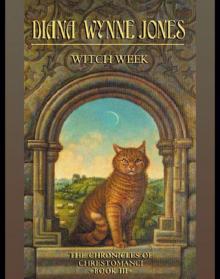 Witch Week
Witch Week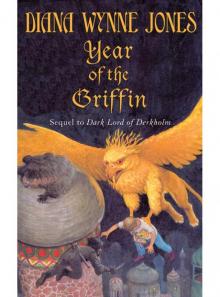 Year of the Griffin
Year of the Griffin Wild Robert
Wild Robert Earwig and the Witch
Earwig and the Witch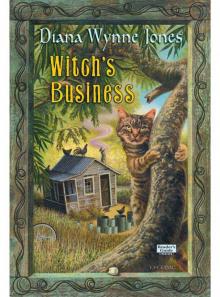 Witch's Business
Witch's Business Dogsbody
Dogsbody Caribbean Cruising
Caribbean Cruising Cart and Cwidder
Cart and Cwidder Conrad's Fate
Conrad's Fate Howl's Moving Castle
Howl's Moving Castle The Spellcoats
The Spellcoats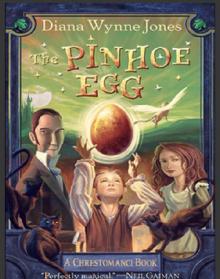 The Pinhoe Egg
The Pinhoe Egg Drowned Ammet
Drowned Ammet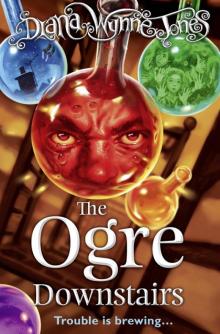 The Ogre Downstairs
The Ogre Downstairs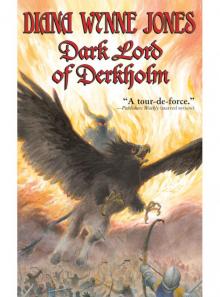 Dark Lord of Derkholm
Dark Lord of Derkholm Castle in the Air
Castle in the Air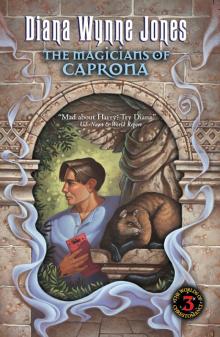 The Magicians of Caprona
The Magicians of Caprona A Tale of Time City
A Tale of Time City The Lives of Christopher Chant
The Lives of Christopher Chant The Magicians of Caprona (UK)
The Magicians of Caprona (UK)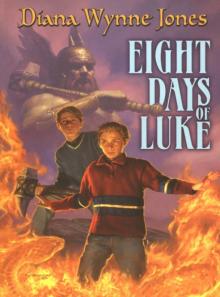 Eight Days of Luke
Eight Days of Luke Conrad's Fate (UK)
Conrad's Fate (UK) A Sudden Wild Magic
A Sudden Wild Magic Mixed Magics (UK)
Mixed Magics (UK)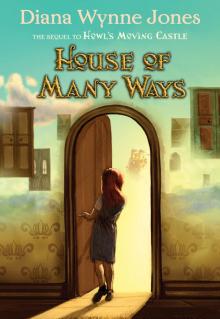 House of Many Ways
House of Many Ways Witch Week (UK)
Witch Week (UK) The Homeward Bounders
The Homeward Bounders The Merlin Conspiracy
The Merlin Conspiracy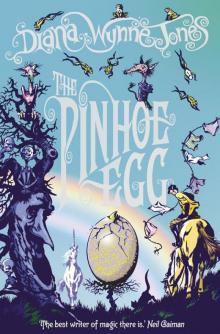 The Pinhoe Egg (UK)
The Pinhoe Egg (UK)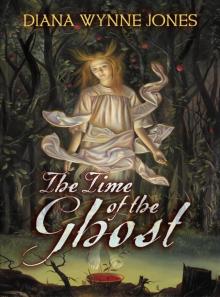 The Time of the Ghost
The Time of the Ghost Hexwood
Hexwood Enchanted Glass
Enchanted Glass The Crown of Dalemark (UK)
The Crown of Dalemark (UK)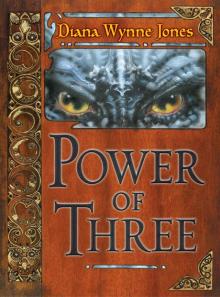 Power of Three
Power of Three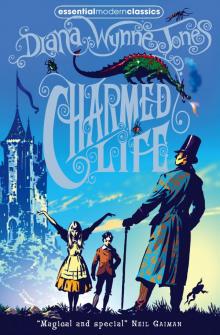 Charmed Life (UK)
Charmed Life (UK)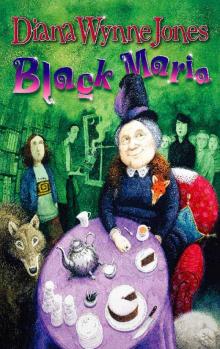 Black Maria
Black Maria The Islands of Chaldea
The Islands of Chaldea Cart and Cwidder (UK)
Cart and Cwidder (UK) Drowned Ammet (UK)
Drowned Ammet (UK) Charmed Life
Charmed Life The Spellcoats (UK)
The Spellcoats (UK) Believing Is Seeing
Believing Is Seeing Samantha's Diary
Samantha's Diary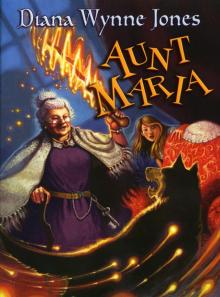 Aunt Maria
Aunt Maria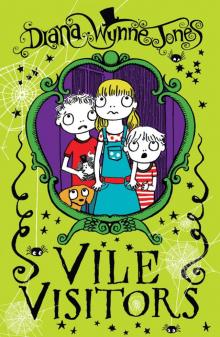 Vile Visitors
Vile Visitors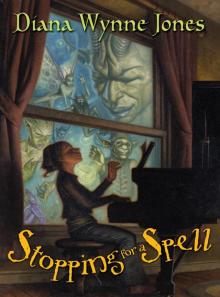 Stopping for a Spell
Stopping for a Spell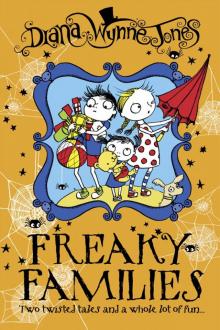 Freaky Families
Freaky Families Unexpected Magic
Unexpected Magic Reflections
Reflections Enna Hittms
Enna Hittms Mixed Magics: Four Tales of Chrestomanci
Mixed Magics: Four Tales of Chrestomanci